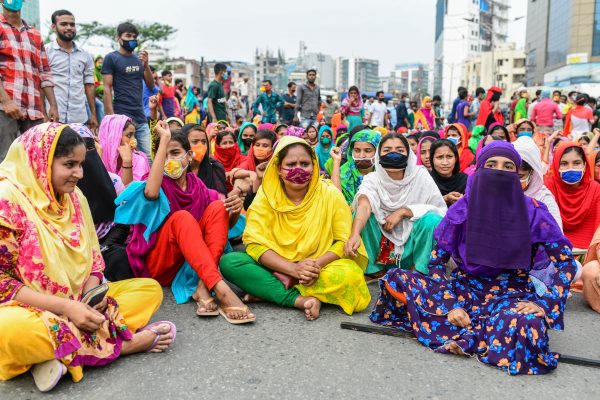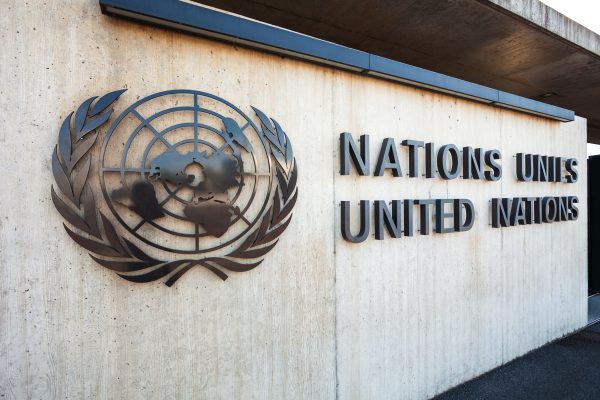This website uses cookies so that we can provide you with the best user experience possible. Cookie information is stored in your browser and performs functions such as recognising you when you return to our website and helping our team to understand which sections of the website you find most interesting and useful.

Day 2 of the negotiations for an international legally binding instrument on transnational corporations and other business enterprises with respect to human rights began on Tuesday 27 October with clear divisions among delegates. Participation was lower than the previous day, but those who did join were active in spite of technical difficulties.
Disagreements arose early on when delegates from the Philippines, Egypt, Iran, Ethiopia, Pakistan, Armenia, Cuba and Russia asked for a limitation of the scope according to resolution 26/9, while most civil society and several other states (Palestine, Mexico, Panama, Ecuador, Brazil and the EU) expressed support for the current wording of article 3.1 on scope, which allows for, but is not limited to, transnational corporations and other business enterprises. Civil society views are also divided in this point.
The EU took the floor again to only ask clarifying questions concerning scope. The delegation asked why the article refers specifically to business activities of transnational character and what would be the implications of replacing it with business enterprises.
Type of companies
The type of companies covered by the draft text raised concerns among some sceptical states. To end the stalemate, Cuba suggested that “references to other types of enterprises should be of a general nature” and “applicable to states that for whatever reason do not have any domestic legislation or legal framework addressing human rights [abuses] by other enterprises that are not transnational enterprises.” This would mean that states could consider this instrument as a basis for national legislation.
Human rights scope
Provisions establishing the scope of the human rights (article 3.3) were subject to some controversy. References to core human rights international instruments – as well as the wording, “to which a state is a party” – drew confusion, as it remains unclear whether this refers to a) a contracting state, b) the state where the abuse occurred or c) the state where the business enterprise is domiciled. One suggestion made was to follow the approach of principle 12 of the UN Guiding Principles.
Uneven application
Another approach could see only international instruments ratified by a state party apply, but this would result in uneven application. Supportive states proposed that complementary rights and principles (such as the right to self-determination and references to international criminal and humanitarian law) also be covered in the draft article. Ethiopia put forward an additional sub-article (article 3.4), which would ensure that, “the scope of this legally binding instrument shall not impede states to develop resources in accordance with national priorities and relevant international instruments.”
Rights of victims
Although provisions related to the rights of victims (article 4) were praised by Ecuador as “one of the most important of the instrument,” and “a creative solution for a complex technical challenge,” it did not escape criticism.
Other states argued that it doesn’t distinguish between procedural and substantive rights; warned that it could be in conflict with article 3; and blasted its wording as both too broad and not broad enough. Some delegates noted that it should include an explicit mention of non-discrimination with regards to nationality to protect the rights of expatriates.
States quarreled over article 4.2, which guarantees victims, among other things, the right to access fair, adequate, effective justice, with some states suggesting minor amendments, while others requested it be scrapped altogether. Palestine regretted that in the spirit of compromise some important elements of victims’ right to effective remedies have been dropped – a reflection shared by some civil society in attendance.
Significant differences remain even regarding article 4.3. Some delegates criticized that it does not address the issues of risk of undue interference, while others addressed the lack of guidance concerning the need to exhaust domestic legal and judicial systems. On this point, Brazil suggested a provision on the principle of subsidiarity using the Inter-American human rights system as an example.
While detractors stressed (again) that only internationally recognised human rights should be acknowledged, the Holy See’s intervention was remarkably visionary on this article. It suggested an explicit reference to the right to a safe, clean, healthy and a sustainable environment, and advocated for specific provisions on proper care for nature, access to territory, as well as fair remediation, not only for damages to affected populations, but territories and environments as well.
On provisions related to the protection of victims (article 5), state reactions were both positive and critical. Egypt supported the current wording, which would require states “to take adequate and effective measures to guarantee a safe and enabling environment for persons, groups and organisations that promote and defend human rights and the environment”. However, Iran cautioned that the article is too generic, and Brazil described it as redundant, arguing that states are already obliged to promote and defend human rights under their own jurisdictions. China also opposed the provisions, echoing earlier statements that the environment should not be treated as a human right. It even insisted that the Treaty should not only require states to protect human rights organisations – it must also establish obligations for them, notably to respect the law.
Due diligence obligations
Talks continued with delegates sorting out their differences on the due diligence obligations imposed by states on companies. Brazil attempted to water down provisions with a damaging submission to replace “all necessary measures” with only appropriate or adequate measures in article 6.1. Egypt and Ethiopia took a more constructive approach by suggesting a clarification on scope and a recommendation to cover digital business activities, respectively.
On the four due diligence steps to be taken by companies, Chile suggested integrating the concept of prioritisation of risks based on severity and likelihood, where it is not feasible to address all identified impacts. Interestingly, keen to strengthen the language of the article, Ethiopia suggested integrating an age perspective in addition to gender.
The duty to conduct meaningful consultations with individuals and communities whose human rights could potentially be affected by business activities sparked a lively debate. Delegates listed other stakeholders to be added to the draft Treaty: the LGBTI community (Chile), people of African descent (Ethiopia) and peasants and rural communities (Egypt). Brazil considered these suggestions to be too vague and lacking adequate criteria.
On the right of indigenous peoples to free, prior and informed consent, enshrined by the ILO Convention no. 169, Chile noted that its ratification is limited (it has only been ratified by 23 states), while Brazil claimed that that the language in the draft text actually differs from the original convention.
France participates
France was the only EU Member State to participate in this session. After noting the adoption of the French law on duty of vigilance, the delegation worryingly implied that there is a need for narrowing the company scope of the treaty, as it regretted the lack of thresholds after which obligations should apply.
The Russian Federation and China were also critical of article 6, calling for recommendations instead of obligations. According to the Russian delegate, each country should determine their own mechanisms for implementation based on their legal system and traditions, and financial and administrative capacities. Likewise, China insisted on flexibility and rejected including rights that do not enjoy international consensus.
Access to remedy
Some states were reluctant to support provisions on access to remedy in article 7. However, Ecuador did warmly welcome this new provision, which did not exist in the previous version of the draft treaty, but did suggest referring to it as “access to justice” – a far more comprehensive term going beyond monetary compensation.
On the other side of the negotiating table, Brazil called for a recognition of the principle of subsidiarity and raised doubts about the need for the reversal of the burden of proof. Similarly, China argued that major differences in legal systems across countries do not allow for common provisions on access to remedy, not only regarding the burden of proof, but also the execution of foreign judgements. Instead, it wants to see a general obligation for states to offer remedy without further detail.












